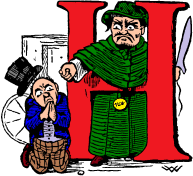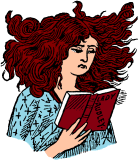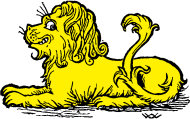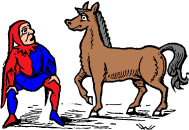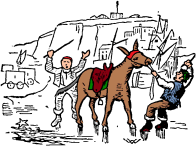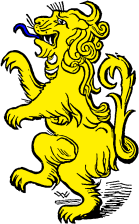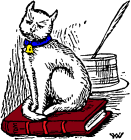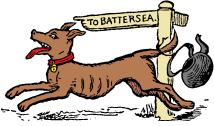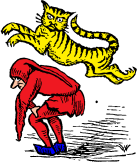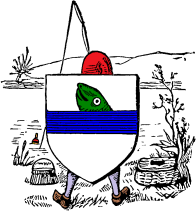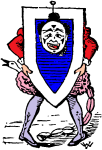HOME
Preface
Introduction
1
2
3
4
5
6
7
8
9
10
11
12
13
14
15
16
17
18
19
20
21
22
23
XI
CHAPTER XI.
OF COMMON CHARGES.
AVING had our fill of Heraldic food at the Ordinaries and Sub-Ordinaries, we shall, so to say, take our dessert off the "Common Charges." Amongst these we might class, the sixpences or shillings, over and above their fares, demanded by, and frequently paid to cabmen; the six-and-eight-pence to a lawyer, for informing you that curling your hair with a boiled carrot is not a criminal offence; the shilling demanded of hurried travellers at Mugby Junction for a purée of horsebeans, called euphemistically soup: all these are very common charges, but unfortunately are not included in Heraldry.
Common Charges are of three kinds: Natural, Artificial, and Chimerical Figures. Thus, we should call a figure representing a donkey as strictly natural, considering the number of those animals(both biped and quadruped) to be found in the world; one representing a wig as decidedly artificial, since we are not aware that any man, woman, or child in a state of nature has yet been discovered with a foreign hair-apparent to his crown; and one representing a lawyer's conscience--could such a charge be invented--as very chimerical, since we never heard of such a thing existing in real life?
To commence, however, with the Natural Figures. They consist of everything in general and most things in particular, and comprise birds, beasts, men (which of course includes women), fishes, insects, infusoria, and other rudimentary animalculae. Anything, in fact, that might or could have life.
The objects--and when we see the unpleasant not to say absurd positions in which some of them are placed by the Heralds we may indeed call them so--which constitute the terrestrial figures are represented either whole or like serial publications, in parts. When in the latter, they appear cut up, and seem acutely to feel the joint-stock element and unnatural combination introduced into their pourtrayal.
There are also a variety of Heraldic phrases descriptive of the different positions assumed, which we shall enumerate and explain, in order that readers may not break their mental shins over them in future researches into the science.
Heraldry has a language--some call it jargon, but they are illnatured--of its own, and anyone guilty of using an incorrect phrase in describing the cognizances or blazon of a shield, is regarded by Garter and Co, as an utter barbarian, with whom no Herald of any self-respect can have dealings. In fact, as a rule, Heraldic misdescriptions grate to such an extent upon the ear of the Tabard wearers that they long for, and would have--were it not that the act might lead them to visit the stately halls of the Ancient Bailey, and subsequent introduction to Marwood--the blood of the offender. Under the circumstances, therefore, they don't get the liquid in question. And now to arm our readers against any possibility of incurring the Heraldic vengeance.
The colour of the hair in men, including women, is described by the word "crined." Thus a lady with hair of a carrotty or fashionable colour would be Heraldically termed "crined gules." If a cockney, however, were to ask if his sheets were "crined," instead of haired, the phrase would be incorrect. As a rule, it may be taken that Heraldic expressions fit badly in domestic life, and are liable to cause him or her using them to be looked upon as a dangerous lunatic. Still our readers may try for themselves; but if ill consequences follow, we accept no blame for the results.
"Couchant"--denotes lying down, though you could hardly say a false witness was couchant because he was, when giving evidence, lying downily.
When an animal is couchant the head is raised, and an artfully expectant look may generally be observed in his or her eye, also an expression, which says, as plainly as possible, "If you come within reach of my paws or teeth, your family will go into mourning, but they needn't worry about the corpse."
"Dormant"--sleeping. This description applies to men (again including women), and beasts, as they are frequently to be seen on the Heraldic shield with a nod appearance.
The "dormant" animal is distinguished from the couchant by having his head resting on his paws, and his tail coiled up along side him, so as to prevent people treading on it. A peaceful calm pervades his countenance, and thoughts of that last Hindoo au naturel which formed his supper, evidently give a gentle zest to his well-earned slumbers.
"Regardant"--a man or beast steadily looking at nothing. This description of figure is frequently found in connection with lions, bears, stags, bulls[N.B.--No connection with Capel Court], and other animals not possessed of human impudence enough to take a sight at anything.
"Statant," standing upright. Persons fond of seeking eleemosynary drinks can vary their usual invocation of "What are you going to stand?" with "Will you be statant?" The British Lion often has to stand a good deal. Instance, the Alabama award. Still, "We don't want to fight, but by jingo," &c.
"Rampant"--rearing. Lions are often seen indulging in this unseemly pastime on the Heraldic field, and, like a bad tenant with his landlord, are frequently in arrear. Under these circumstances, it is the landlord who becomes rampant, and makes things lively for the tenant, by sending him a visitor in the shape of a man in possession, who is not usually a welcome guest.
"Sejant"--sitting. This position would most probably be used to describe a Member of Parliament, or a hen--both do a quantity of cackling--or any other abnormal animal whose principal employment is to sit. It is an eminently peaceful position, and one much used by humanity generally when not walking, standing, or lying. Not but what we have known people who could lie sitting just as well as standing, if not better, but then they had talents for mendacity, which we are certain are wanting to all readers of this work. At least we hope so, although sometimes in the stillness of the night doubts will arise even on that point.
"Current,"--which has no connection with tarts, but means running,--is generally found associated with stags and dogs in Heraldry; out of it, bills have also that peculiarity.
Fraudulent bankrupts have also been known to be current, especially if their creditors were after them. As a rule, however, the criminal law has a tendency to disapprove of their funny way of running on.
Money also, both good and bad, is current. We prefer the former, and as much of it as possible. No reduction made on taking a quantity.
"Salient" leaping--applied to lions and tigers, who, like flowers, often appear in the spring. Not that the time of year makes the slightest difference to them. As a rule, a lion or a tiger is a creature quite devoid of prejudice, and is as ready to eat you in the summer, autumn, or winter, as in the spring. The high jump at an athletic meeting is also a salient subject for the persons who compete.
"Nascent"--rising out of the midst of an ordinary; thus a grog-blossom rising out of the midst of a nose would be so described, though we are not aware of any family which bears that peculiar flower as a portion of its cognizance, though what says the Bard of Erin,--
"It's a nose tree in full bearing."
But no Moore upon that head.
Counter--current; two animals, human or otherwise, running in opposite directions. In common life we often see this peculiarity; for instance, one man will run into £10,000 a year, and another into the workhouse: one man on to the bench, and another into the dock. But there, we might continue our illustrations from here to the middle of next year, were it convenient; but as it is not, we shall, like the old preachers, proceed to our--
Lastly, we have "Issuant," which denotes anything coming out of the top or bottom of an ordinary. As an example, we might take the speeches of many public characters which frequently issue from the mouths of very ordinary men indeed.
There are many other descriptive terms, but the above are the chief ones. Anyone can manufacture them to order by simply adding the syllable "ant" to the descriptive word, thus:--
"Smokant," "kickant," "hookant," "smilant," "drunkant," &c., &c.; and so, as the showman says, "on we go again, my little dears, up and down, in and out, and all round the show," to the next chapter.
XI
1
2
3
4
5
6
7
8
9
10
11
12
13
14
15
16
17
18
19
20
21
22
23
Preface
Introduction
HOME
Build: 2019/04/20 14:20:08.59+0900(JST)


